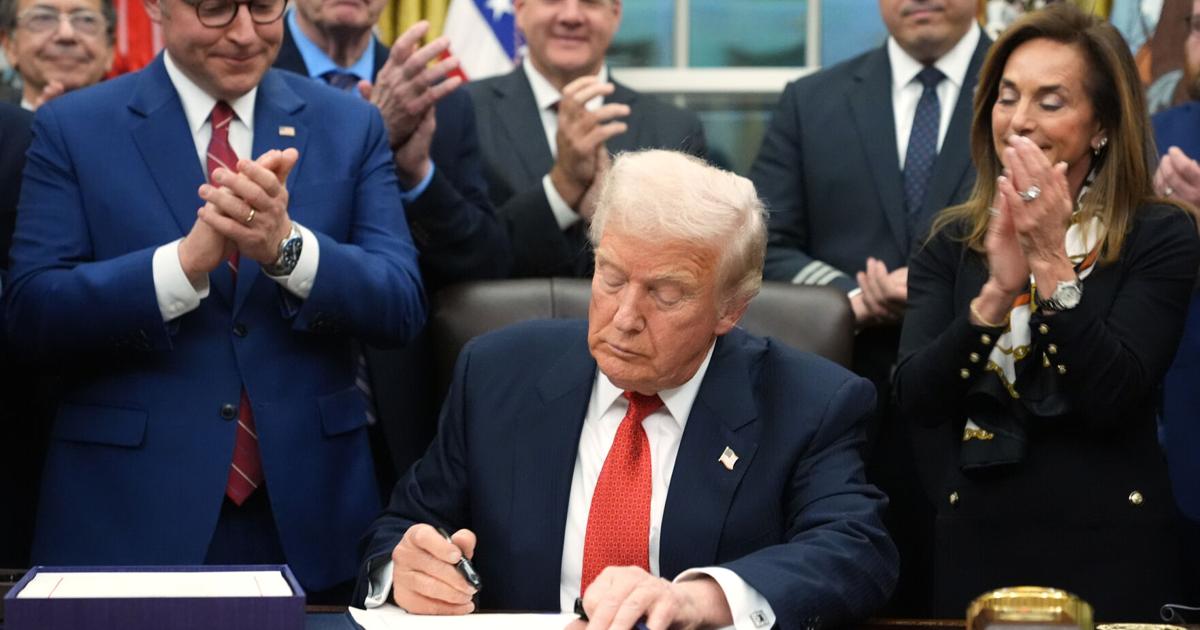WASHINGTON — President Donald Trump signed a government funding bill Wednesday night, ending a record 43-day shutdown that had caused financial stress for federal workers, stranded travelers at airports and created long lines at some food banks.
The shutdown magnified partisan divisions in Washington as Trump took unprecedented unilateral actions — including canceling projects and attempting to fire federal workers — to pressure Democrats into relenting on their demands.
“So I just want to tell the American people, you should not forget this,” Trump said. “When we come up to midterms and other things, don’t forget what they’ve done to our country.”
House and Senate Approval
The signing ceremony came just hours after the House passed the measure on a mostly party-line vote of 222-209. The Senate had already approved the bill on Monday.
Democrats had pushed to extend an enhanced tax credit expiring at year’s end, which lowers the cost of health coverage obtained through Affordable Care Act marketplaces. They refused to support a short-term spending bill that did not include that priority. Republicans, in turn, argued that the health care fight should be held separately.
“We told you 43 days ago from bitter experience that government shutdowns don’t work,” said Rep. Tom Cole, the Republican chairman of the House Appropriations Committee. “They never achieve the objective that you announce. And guess what? You haven’t achieved that objective yet, and you’re not going to.”
Lawmakers Reflect on the Shutdown
Debate on the House floor was often heated. Republicans accused Democrats of using the pain generated by the shutdown to gain leverage in policy disputes.
“They knew it would cause pain and they did it anyway,” House Speaker Mike Johnson said.
Democrats countered that Republicans had raced to pass tax breaks earlier in the year that they say mostly benefited the wealthy.
“The bill leaves families twisting in the wind with zero guarantee there will ever, ever be a vote to extend tax credits to help everyday people pay for their health care,” said Rep. Jim McGovern, D-Mass.
Democratic leader Hakeem Jeffries vowed to continue the fight for the subsidy extension, saying, “This fight is not over. We’re just getting started.”
Key Provisions of the Funding Bill
The compromise, brokered by eight bipartisan senators, funds three annual spending bills and extends the rest of government funding through January 30, 2024. Key elements include:
• A reversal of Trump administration actions to fire federal workers during the shutdown
• Protection against further layoffs through January and guaranteed back pay for affected employees
• Full funding for Agriculture Department food assistance programs through the rest of the budget year
• $203.5 million for increased security for lawmakers and $28 million for Supreme Court justices’ protection
• A new provision allowing senators to sue federal agencies or employees for up to $500,000 in damages if electronic records are searched without notification—widely viewed as targeting investigations into Trump’s 2020 election challenges
House Speaker Mike Johnson expressed frustration over the last-minute inclusion of the lawsuit language and pledged a vote on the matter as soon as next week.
The Health Care Subsidy Battle Continues
The most contentious issue remains the expiring enhanced tax credit under the Affordable Care Act. Republicans argue that the COVID-era boost was always temporary, while Democrats warn that ending it will double premiums for millions and lead to 2 million losing coverage next year, according to the Congressional Budget Office.
“It’s a subsidy on top of a subsidy. Our friends added it during COVID. COVID is over,” said Rep. Tom Cole.
Rep. Nancy Pelosi, D-Calif., defended the measure, saying, “All they have done is try to eliminate access to health care in our country. The country is catching on to them.”
Looking Ahead
With a mid-December deadline for the next funding lapse, both parties face pressure to reach a deal. Some Republicans support extending the subsidies with new income caps or by routing tax dollars through individuals rather than insurers. Sen. Susan Collins, R-Maine, has voiced openness to such changes, and some Democrats appear willing to negotiate.
Still, skepticism remains high. Rep. Rosa DeLauro, D-Conn., top Democrat on the House Appropriations Committee, warned that many Republicans still aim to repeal the Affordable Care Act entirely.
“Their goal has been clear for the past 15 years,” DeLauro said. “That’s where they’re trying to go.”
https://www.phillytrib.com/news/trump-signs-government-funding-bill-ending-shutdown-after-a-record-43-day-disruption/article_57982548-ac55-4943-bfa4-5009a0bc097b.html


